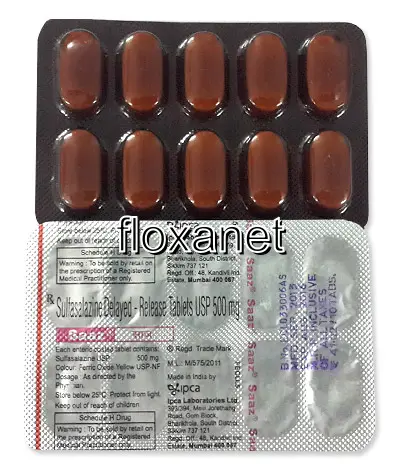Buy Sulfasalazine Online from Trusted UK Pharmacy
| Package | Dosage | Price | Price per Dose | |
|---|---|---|---|---|
| Dosage: 500mg | ||||
| 360 pill | 500mg | £396.08 | £1.10 | |
| 270 pill | 500mg | £308.63 | £1.14 | |
| 180 pill | 500mg | £226.33 | £1.26 | |
| 120 pill | 500mg | £165.63 | £1.38 | |
| 90 pill | 500mg | £132.71 | £1.47 | |
| 60 pill | 500mg | £97.73 | £1.64 | |
| 30 pill | 500mg | £60.69 | £2.01 | |

Sulfasalazine Description
Introduction to Sulfasalazine
Sulfasalazine is a medication commonly used to treat inflammatory conditions, particularly those affecting the intestines and joints. It is classified as a disease-modifying antirheumatic drug (DMARD) and anti-inflammatory agent. The compound combines sulfonamide and salicylate components, which work together to reduce inflammation in the body. This medication has been in use for many decades and remains a vital part of treatment for conditions like rheumatoid arthritis, ulcerative colitis, and Crohn’s disease.
Mechanism of Action
Sulfasalazine works primarily through its anti-inflammatory and immunomodulatory effects. Once administered, it is metabolized in the colon into its active components: sulfapyridine and 5-aminosalicylic acid (5-ASA). The 5-ASA portion acts locally on the intestinal lining to decrease inflammation, which is beneficial in ulcerative colitis and Crohn’s disease. Meanwhile, sulfapyridine helps suppress the immune response contributing to joint inflammation in rheumatoid arthritis. This dual action makes sulfasalazine effective in managing different inflammatory conditions.
Benefits and Effectiveness
Many patients find sulfasalazine effective in controlling their symptoms. It can significantly reduce intestinal inflammation, leading to fewer flare-ups and improved quality of life for those with ulcerative colitis or Crohn’s disease. For rheumatoid arthritis patients, sulfasalazine can help diminish joint pain, swelling, and stiffness. It’s often used as part of a comprehensive treatment plan, combined with other medications or therapies. While it may take several weeks before full benefits are observed, consistent use often results in symptom improvement and disease control.
Possible Side Effects
Like all medications, sulfasalazine can cause side effects. Common issues include nausea, headache, dizziness, and sometimes stomach upset. In some cases, patients may experience allergic reactions such as skin rashes or sensitivity to sunlight. More rarely, blood cell counts can be affected, leading to conditions like anemia or leukopenia. It is important for users to undergo regular blood tests to monitor for any adverse effects. Additionally, some patients may experience flu-like symptoms or joint pain during the initial stages of treatment.
Precautions and Considerations
Before starting sulfasalazine, patients should inform their healthcare provider about any allergies, especially to sulfonamides or other medications. It is also essential to discuss existing health conditions, such as liver or kidney problems, as these may influence treatment decisions. Pregnant or breastfeeding women should consult their doctor, as safety during pregnancy is not fully established. Regular medical supervision and laboratory monitoring are recommended to ensure the medication's safe use. Patients should also be aware of potential interactions with other drugs, such as methotrexate or certain antibiotics.
Usage and Dosage
Sulfasalazine is typically taken orally in the form of tablets or capsules. The dosage depends on the severity of the condition being treated and the patient's response. It is usually started at a lower dose, gradually adjusted to minimize side effects. Patients should follow the prescribed schedule carefully, and it is important not to stop medication abruptly without consulting a healthcare provider. Taking the medication with food can help reduce gastrointestinal discomfort.
Conclusion
Sulfasalazine remains a trusted and effective medication for managing inflammatory bowel diseases and rheumatoid arthritis. Its dual mechanism of action offers targeted relief of symptoms while modulating immune responses. However, like all medications, it requires careful monitoring and adherence to the prescribed regimen. Patients should maintain regular contact with their healthcare providers to ensure optimal outcomes and promptly address any side effects or concerns that may arise during treatment.
See Also
